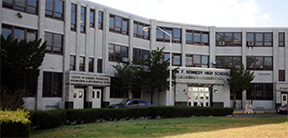 By JOE MALINCONICO
By JOE MALINCONICO
PATERSON – A survey conducted among students at Kennedy high school in 2014 found that 6.8 percent of them said they had used heroin within the past 30 days, according to the Paterson Coalition Against Substance Abuse.
That percentage is more than three times higher than the national and state average rates for teenage heroin use, according to a professor at Montclair State University who is director of the coalition. New Jersey’s rate is about 2 percent and the national rate is about 2.2 percent, said the professor, Robert J. Reid, from the College of Education and Human Services.
The coalition, which calls itself P-CASA, is getting ready to release a comprehensive report on the survey at Kennedy. P-CASA provided Paterson Press with some of the preliminary findings of its study on Monday after members of the coalition read a news story last week about an increase in positive drug tests at Paterson schools.
“Our hope is that the report and data will allow community members, policy makers, city staff, and other youth serving organizations to have the necessary information and tools to combat the drug and alcohol problem impacting Paterson’s young people,” said Reid in a written statement. “Working together and sharing information can help to create a safer drug-free Paterson.”
The coalition, which is federally-funded, surveyed 737 students at Kennedy in 2014 about their use of substances, including illegal drugs, alcohol and tobacco, Reid said. The questions were based on a survey used by the Centers for Disease Control and Prevention in Atlanta, Reid said. The group received parental consent from all teens who participated in the survey, according to the coalition.
About 25 percent of the surveyed students – or 184 of them – said they had used alcohol in the past 30 days, according to the P-CASA report.
Among those students who said they drank alcohol within 30 days, 20 percent, or 37 of them, said they also had taken heroin and 50 percent, or 92, said they had used marijuana, according to the report,
“With the environment and atmosphere we have in the city right now, it’s not surprising to me,” said Kevin Womble, a community activist and member of P-CASA.
Womble said that part of the problem is that too often the parents of Paterson’s youth are themselves involved in the drug trade as users or sellers. “They’re not giving them the morality against it,” said Womble. “The kids are accustomed to being around it.”
“There’s no secret that we have a serious opioid problem not just in Paterson but in the nation,” said Paterson Police Director Jerry Speziale.
LeeAnn Mandrillo, a communications specialist working with the coalition, said the full report will include the teenagers’ input on what factor precipitated their substance use. Under its grants, P-CASA is focusing on Paterson’s 1st Ward. That why the survey was done at Kennedy coalition members said.
School district spokeswoman Terry Corallo said “any indicators denoting a rise in substance abuse is very concerning.”
“Although this particular data is from a survey taken two years ago, we welcome Dr. Reid’s providing us with a full report of the survey’s findings and letting us know if he has any additional recommendations beyond the steps the district currently has in place to help address this issue,” said Corallo.
School board member Errol Kerr called the findings of the P-CASA survey “terrible news.”
Some community activists say the district ought to increase the number of certified student assistance coordinators (also known as SACs). Budget cuts in 2010 resulted in layoffs that helped lower the numbers of SACs in the district had declined from 24 to 11.
Sgt. Dalton Price, a member of P-CASA and part of Paterson’s Community Policing unit, said he has yet to notice widespread signs of heroin use among city youths. “I can’t say whether it’s true or not, but I haven’t seen it,” said Price.
Nancy Grier, a community activist and member of the coalition, said was dismayed by the survey’s findings. “If we have high school kids doing heroin, that a major problem,” Grier said.



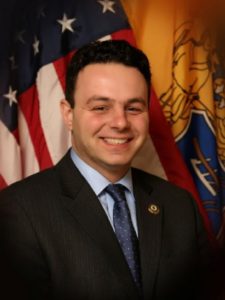 Regarding “
Regarding “
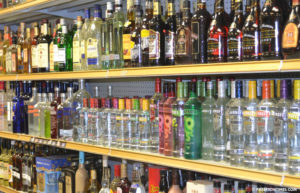 The city council unanimously enacted a new ordinance to force liquor stores to stop selling package goods – including beer and wine – after 10 p.m. The measure was heavily lobbied for by local young people and anti-drug advocates.
The city council unanimously enacted a new ordinance to force liquor stores to stop selling package goods – including beer and wine – after 10 p.m. The measure was heavily lobbied for by local young people and anti-drug advocates.
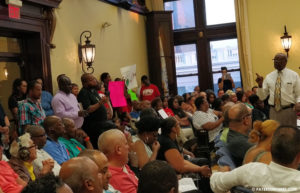 The city council unanimously voted to approve a new ordinance that forces liquor businesses that sell package goods to close at 10 p.m. Council members gave preliminary approval to the new law on Tuesday night.
The city council unanimously voted to approve a new ordinance that forces liquor businesses that sell package goods to close at 10 p.m. Council members gave preliminary approval to the new law on Tuesday night.
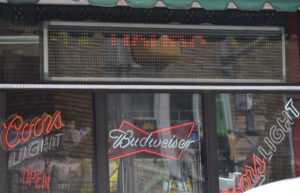 Mayor Jose “Joey” Torres’ administration has presented an ordinance to the city council seeking to impose early closing hours on liquor businesses that sell package goods.
Mayor Jose “Joey” Torres’ administration has presented an ordinance to the city council seeking to impose early closing hours on liquor businesses that sell package goods.